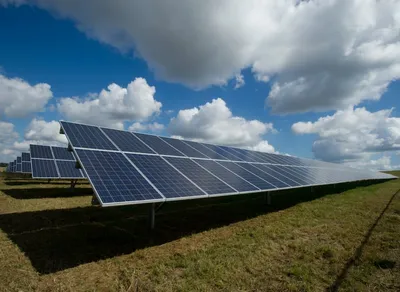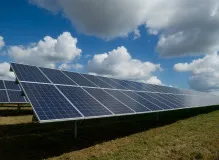For over long years, we have diligently conducted independent research and product testing. When you make a purchase through our links, we may earn a commission.
Get Approved for a Affordable Solar Loan Today!
Created: 1 month ago

10 min Read
Get approved for an affordable solar loan today! Discover how you can finance your solar project and start saving on energy costs. Take advantage of our expert SEO tips to increase your chances of approval. Act now and make the switch to renewable energy!
The benefits of solar energy are numerous and far-reaching. Solar power is a clean and renewable source of energy that can help reduce our reliance on fossil fuels, decrease harmful emissions, and combat climate change. By harnessing the power of the sun, we can generate electricity for our homes and businesses without depleting natural resources or contributing to air pollution. Additionally, solar energy can provide long-term cost savings by reducing or even eliminating monthly energy bills. Investing in solar power not only benefits the environment but also offers financial advantages for homeowners and businesses alike. With the right financing option, such as a solar loan, you can unlock the full potential of solar energy and enjoy the many advantages it brings.
🌞 Advantages of Solar Energy
There are several advantages to using solar energy as a sustainable source of power. Let's explore some of the key benefits:
1. 🔋 Cost Savings
One of the primary advantages of solar energy is the potential for significant cost savings. By generating your own energy from the sun, you can reduce your dependence on traditional utility companies and decrease your monthly electricity bills. In some cases, solar panels may even produce excess energy, which can be sold back to the grid, resulting in additional savings.
2. 🌱 Environmental Impact
Solar energy is a clean and renewable source of power. Unlike fossil fuels, solar power does not release harmful pollutants or greenhouse gases into the atmosphere. By choosing solar energy, you can significantly reduce your carbon footprint and contribute to a healthier planet for future generations.
3. ⚡ Energy Independence
With solar energy, you can become less reliant on the unpredictable costs and availability of traditional energy sources. By producing your own electricity, you can secure your energy future and gain more control over your energy usage. This can be especially beneficial during power outages or in remote locations where access to the electrical grid may be limited.
4. 💰 Financial Incentives
Many governments and organizations offer financial incentives to encourage the adoption of solar energy. These incentives can include tax credits, rebates, and grants, which can significantly reduce the upfront costs of installing solar panels. Additionally, some utility companies may offer net metering programs, allowing you to earn credits for excess energy produced by your solar system.
5. 🌍 Contribution to a Sustainable Future
Choosing solar energy means actively participating in the shift towards a more sustainable future. By investing in renewable energy, you are helping to decrease our reliance on finite resources and combat climate change. Your decision to go solar can inspire others to follow suit and create a positive ripple effect in the community.
🌿 Conclusion
Solar energy offers a multitude of benefits, from cost savings to environmental impact. By financing your solar project with a solar loan and leveraging expert SEO tips, you can increase your chances of approval and make the switch to renewable energy with ease. Embrace the power of the sun and take a step towards a greener and cleaner future. Act now and start reaping the rewards of solar energy today!
When it comes to financing your solar project, understanding solar loans is essential. Solar loans provide homeowners and businesses with the necessary funds to install solar panels and start harnessing the power of the sun. 🌞💰
How do solar loans work?
Solar loans are a type of financing specifically designed for solar energy systems. These loans allow you to borrow the money needed to purchase and install solar panels. Unlike traditional loans, solar loans typically have favorable terms, such as low interest rates and longer repayment periods, making them more affordable and accessible for borrowers.
Benefits of solar loans
✅ Affordability: By opting for a solar loan, you can avoid the upfront costs of purchasing a solar energy system outright. This makes solar power more accessible to a broader range of consumers.
✅ Immediate Savings: Once your solar panels are installed, you can start generating your own electricity and reduce your reliance on the grid. This can lead to immediate savings on your monthly energy bills.
✅ Long-term Investment: Investing in solar energy is not only beneficial for the environment but also for your financial well-being. Solar panels have a long lifespan and can provide a return on investment over time through energy savings.
✅ Increase Property Value: Installing solar panels can increase the value of your property. Many homebuyers are now actively seeking properties with solar energy systems, making it a desirable asset for potential buyers.
Choosing the right solar loan
When considering a solar loan, it's essential to explore your options and choose the loan that best suits your needs.
➡️ Interest rates: Compare interest rates offered by different lenders and opt for the lowest rate possible to minimize the overall cost of borrowing.
➡️ Loan terms: Consider the length of the loan term and choose a repayment period that aligns with your financial goals and capabilities.
➡️ Loan amounts: Determine the total amount of funding you need for your solar project and ensure that the loan you choose covers the full cost.
➡️ Credit requirements: Some solar loan providers may have specific credit requirements. Check your credit score and ensure that you meet the lender's criteria.
Conclusion
Solar loans can provide the financial means to embrace the benefits of solar energy. By understanding how solar loans work and considering the key factors in choosing the right loan, you can make a well-informed decision for your solar project. Start enjoying the advantages of solar power and join the renewable energy revolution today! 🌞💰
Benefits of Affordable Solar Loans
When it comes to financing your solar project, affordable solar loans offer numerous benefits. These loans provide homeowners and businesses with the necessary funds to install solar panels and start harnessing the power of the sun. By taking advantage of these financing options, you can maximize your savings and enjoy a range of advantages. Let's explore the key benefits of affordable solar loans:
1. Cost Savings: One of the primary benefits of affordable solar loans is the potential for significant cost savings. By financing your solar project, you can avoid the upfront costs of purchasing a solar energy system outright. This makes solar power more accessible and affordable for a wide range of consumers.
2. Energy Independence: With an affordable solar loan, you can become less reliant on the unpredictable costs and availability of traditional energy sources. By generating your own electricity from solar panels, you can secure your energy future and gain more control over your energy usage. This can be especially beneficial during power outages or in remote locations where access to the electrical grid may be limited.
3. Environmental Impact: By investing in solar energy through an affordable loan, you are actively contributing to a healthier planet. Solar power is a clean and renewable source of energy that does not release harmful pollutants or greenhouse gases into the atmosphere. By reducing your reliance on fossil fuels, you can decrease your carbon footprint and help combat climate change.
4. Long-term Savings: By financing your solar project with an affordable loan, you can enjoy long-term financial savings. Solar panels can significantly reduce or even eliminate your monthly energy bills, resulting in substantial savings over the lifespan of the system. Additionally, as energy costs continue to rise, your investment in solar energy can act as a hedge against future price increases.
5. Increased Property Value: Installing a solar energy system through an affordable loan can also increase the value of your property. Many homebuyers are now actively seeking homes with solar panels, recognizing the long-term cost savings and environmental benefits they offer. By investing in solar, you can make your property more attractive to potential buyers and potentially command a higher sale price.
6. Government Incentives: In many regions, there are government incentives and rebates available to incentivize the adoption of solar energy. These incentives can significantly reduce the overall cost of installing solar panels and make it even more affordable for homeowners and businesses. By maximizing the benefits of these incentives, you can further enhance the financial advantages of an affordable solar loan.
In conclusion, affordable solar loans offer a range of benefits for those looking to finance their solar projects. From cost savings and energy independence to environmental impact and increased property value, these loans provide a pathway to renewable energy and long-term savings. By exploring your options and finding the right loan for your needs, you can make the switch to solar energy and start enjoying the many advantages it brings.
Eligibility Requirements for Solar Loan Approval
Securing a solar loan to finance your solar energy system is an excellent investment in a greener and more sustainable future. However, it's essential to meet certain eligibility requirements to increase your chances of loan approval. Let's explore the key factors that lenders typically consider when evaluating solar loan applications:
-
Credit Score: A good credit score is crucial in demonstrating your financial responsibility and ability to make regular loan repayments. Lenders typically look for a credit score of at least 640, although some lenders may have higher or lower requirements. If your credit score falls below the desired threshold, you can take steps to improve it before applying for a solar loan.
-
Income: Demonstrating a stable and sufficient income is essential for lenders to assess your ability to repay the loan. Lenders may request documents such as tax returns, pay stubs, or bank statements to verify your income. Aim to provide accurate and up-to-date financial records to strengthen your application.
-
Debt-to-Income Ratio: Lenders analyze your debt-to-income ratio to assess your ability to manage debt. Typically, lenders prefer a debt-to-income ratio of 43% or lower, meaning your monthly debt obligations (including the proposed solar loan payment) should not exceed 43% of your gross monthly income.
-
Home Ownership: While owning a home is not always a requirement for solar loan eligibility, it can be an advantage. Homeowners may have access to solar loans with more favorable terms, such as lower interest rates or longer repayment periods. However, non-homeowners can still qualify for solar loans based on their creditworthiness and financial situation.
-
Solar Project Documentation: Lenders may review documents related to the proposed solar project, such as installation contracts, warranties, and permits. Ensuring that all documentation is accurate, up-to-date, and in compliance with local regulations can bolster your chances of solar loan approval.
-
Residential or Commercial Property: Solar loans are available for both residential and commercial properties. Lenders may have specific criteria for each type of property, so it's essential to research and understand the eligibility requirements for your specific property type.
-
Loan-to-Value Ratio: The loan-to-value ratio (LTV) measures the loan amount relative to the appraised value of the property. Lenders typically prefer an LTV ratio of 80% or lower. If the proposed solar loan exceeds this threshold, you may need to consider providing additional collateral or a larger down payment.
-
Age of Property: Some lenders consider the age and condition of the property when evaluating solar loan applications. Older properties may require additional inspections or assessments to ensure the structural integrity and feasibility of installing a solar energy system.
🌞By meeting these eligibility requirements and providing accurate documentation, you can enhance your chances of obtaining approval for a solar loan. It's crucial to work with a reputable lender who specializes in solar financing and understands the unique requirements of the industry. Take the time to research different lenders, compare loan terms, and choose an option that aligns with your financial objectives and circumstances. With the right solar loan, you can embark on a sustainable and affordable energy journey.












